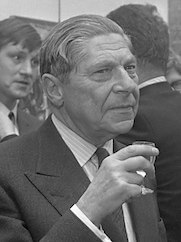Arthur Koestler: Brilliant writer who is still relevant in 2023?
Arthur Koestler is a name that has been etched in the annals of history, leaving behind an incredible legacy that has inspired generations. His life was full of eventful experiences, from his birth in 1905 in Budapest to his death in 1983 in London. He was a renowned author, political activist, and intellectual who made significant contributions to the fields of literature, science, and philosophy. Throughout his life, Koestler was very interested in trying to figure out what makes people mysterious.
Early Life: Childhood and Education
Arthur Koestler (1905–1983) was a Hungarian-born British author and journalist whose career spanned five decades and whose work focused largely on the topics of freedom, authority, and political change. Koestler’s early life is just as fascinating as his later works.
Koestler was born in Budapest, Hungary, in 1905 to Jewish parents. He had a privileged childhood with private schooling, in which he excelled academically. After high school, he studied science at the University of Vienna before transferring to the University of Berlin, where he became interested in Marxist politics and joined the Communist Party in 1931. In 1933, when Hitler came into power, Koestler fled Germany for Paris, where he continued to write about politics and social issues until finally settling in England later that same year.
Political Involvement: Communism and Zionism
Arthur Koestler was one of the most influential figures in the world of politics during the mid-20th century. He was a journalist and novelist who was born in Hungary. His life and works were admired for their political insight. He was best known for his involvement in communism and Zionism, which were two of the most important political movements of the time.
Koestler’s Marxist ideology saw him become a prominent member of the Communist Party during the 1930s. His support for Stalinism caused him to be labeled a ‘fellow traveler by many; however, after witnessing firsthand Stalin’s atrocities, he became disillusioned with communism, eventually forming a more critical stance on its principles. He later became an advocate for Zionism, believing that it would provide Jews with a safe haven from European anti-Semitism and violence.
Writing Career: Successful Novels
Arthur Koestler was one of the most influential writers of the twentieth century. His career spanned both fiction and nonfiction, but it was his novels that made him a household name. Among them were “Darkness at Noon”, “The Gladiators”, and “Arrival and Departure—each a critically acclaimed work that explored human morality, politics, religion, and psychology.
Of all his books, “Darkness at Noon” is perhaps the most famous; its vivid exploration of totalitarianism in Europe made it an instant classic. Koestler’s other novels followed in a similar fashion, with intense themes, threaded through with trenchant wit and insight. His nonfiction ranged from a study of creativity to a critique of the ideology behind Hitler’s rise to power. Koestler was born in Hungary and studied psychology at the University of Vienna, but his career as a psychologist was cut short when he joined the French Foreign Legion during World War I.
Legacy: Controversy and Impact
Arthur Koestler was one of the most controversial personalities of the twentieth century. His works, which ranged from fiction to philosophy, were both acclaimed and criticized. He was a man of many talents, but his legacy has been marred by accusations of anti-Semitism and other moral failings.
Koestler’s life story is complex and deeply intertwined with his prolific output. He was born in Budapest in 1905 and went to school in Vienna until 1931 when he joined the Communist Party. During the Spanish Civil War, he was arrested for being a political activist. This led to him writing the classic novel Darkness at Noon in 1940. Even though he left the party after Stalin’s purges, he was always a strong critic of totalitarianism for the rest of his life.
Read what George Orwell had to say about Koestler here.
Koestler had three marriages throughout his lifetime and fathered at least three children.
His first marriage was to Dorothy Asher in 1935, whom he divorced after eight months of being together. They had one biological son named Jonathan, who passed away at the age of 20 due to a brain tumor. He reached an amicable divorce agreement with Dorothy, which cleared the way for him to marry Mamaine Paget.
His second marriage in 1940 lasted until his death 40 years later, with Mamaine Paget as his wife. This union produced two children: John David, who died at the age of 10 from an accident, and a daughter named Rachel, who lived until 2013, when she passed away from dementia-related complications.
His third marriage was to Cynthia Jefferies, which lasted until both of them decided to die in a suicide in 1983. He was suffering from Parkinson’s disease and slow-progressing leukemia, and his wife was 55 years old at the time with no known

